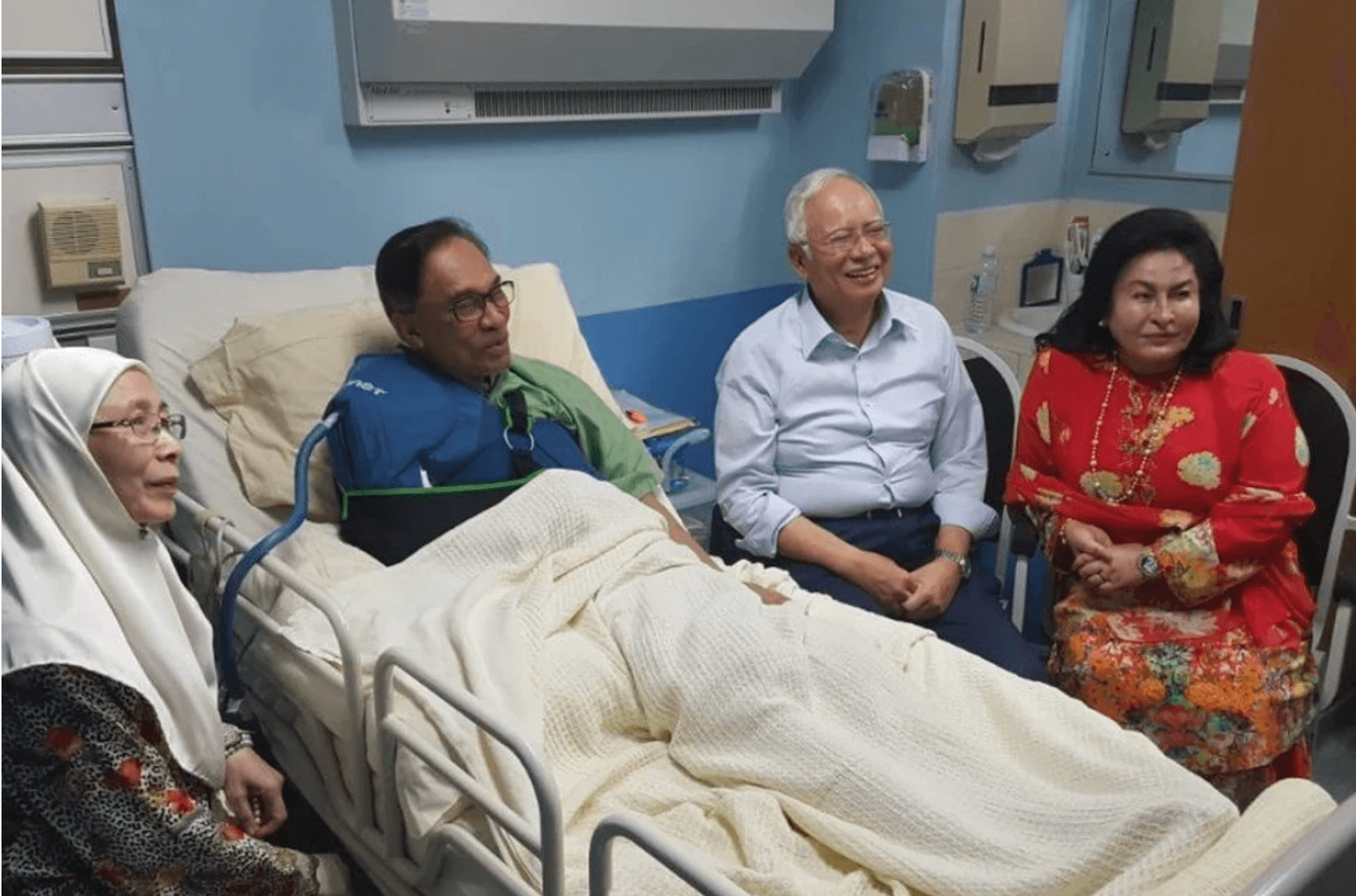Najib, Anwar prepare to debate, minus the excitement of a decade ago
Analysts question the relevance not only of the topic to the larger Malaysian public, but also that of the two 'friendly foes'.
Since former prime minister Najib Razak and PKR president Anwar Ibrahim announced their willingness to participate in a debate, the joke making the rounds is that two leaders with a history of criminal convictions would be coming together to talk about national issues.
Anwar has served two prison terms for corruption and sodomy respectively. Najib meanwhile is waiting for his final appeal in court after being convicted of misappropriating hundreds of millions of ringgit. Both recently clashed on social media over troubled oil and gas services company Sapura Energy Bhd.
This was after PKR’s Rafizi Ramli criticised Najib for proposing that the government help Sapura, which recently announced a loss of RM8.9 billion, including in the form of a takeover of the company by national oil firm Petronas.
Debates between top politicians have long been part of Malaysia’s political scene, especially since the much publicised fuel price debate in 2008 between Anwar and then communications and multimedia minister Ahmad Shabery Cheek. That was the first time that an opposition leader’s debate with a government leader was telecast live on national television, in what was seen as part of a political liberalisation by then prime minister Abdullah Ahmad Badawi.
It was a huge publicity boost for the opposition.
Since then, politicians have hoped to cash in on the same limelight, with such debates differing from the mundane and rule-bound discussions in Parliament.
DAP’s Lim Guan Eng has twice debated with the party’s arch rival MCA, once with its then president Chua Soi Lek in 2012, and another time late last year with current president Wee Ka Siong.
In 2012, meanwhile, Rafizi debated issues related to study loan PTPTN with then Umno Youth chief Khairy Jamaluddin.
That debate led to calls for Najib, who was leading the Barisan Nasional government at the time, to come face to face with Anwar, the opposition leader.
Najib eventually rejected such calls, saying that debates were not part of Malaysian political culture.
‘Two leaders past their time’
Today, the prospect of a debate between the two fails to generate the same excitement among Malaysians as it did 10 years ago.
Observers have questioned the relevance of a debate between them, given their political trajectory which appears to be taking them further from the seat of power.
Najib has been convicted and sentenced over RM42 million related to SRC International channelled into his private accounts. Anwar, meanwhile, has been seen as losing his influence in PKR and Pakatan Harapan (PH) following his party’s poor performance at three consecutive state elections in Melaka, Sarawak and Johor.
Since his fall from power in 2018, Najib has challenged DAP supremo Lim Kit Siang and Bersatu leader Muhyiddin Yassin to debate with him, while brushing aside a recent challenge from International Trade and Industry Minister Mohamed Azmin Ali to take him on over Felda issues.
Najib’s debate with Anwar this time will take place with the two more as friendly foes than the political enemies they were a decade ago. In October 2020, Najib supported Anwar’s bid to become prime minister in a joint letter to the palace with Umno president Ahmad Zahid Hamidi.
A former aide of Najib welcomed debates, saying they were good for a maturing democracy.
“But sometimes you don’t get to choose the debaters, who could be seasoned politicians still hogging the limelight,” said Oh Ei Sun of the Singapore Institute of International Affairs.
Analyst Hisommudin Bakar, meanwhile, sees a problem with debates between politicians in Malaysia: they do not provide a standard for clear assessment by the public or voters.
“There is no yardstick for making debates a contributor to support for a particular party or figure,” said Hisommuddin, who leads electoral think tank Ilham Centre.
Referring to the debate between Lim and Wee last year, he said there had been no real impact from the event on a national scale.
“All it showed was that these two leaders had brought their dispute to the debate stage,” he said.
Personalities, not issues
Hisommuddin said in such debates, a clash of personalities would overshadow the topic.
“Looking at the importance of the debates and their timing, I see them as being used more to raise the image of certain political parties,” he said.
Political observer Azizi Safar meanwhile said debates were to resolve questions and find solutions to public interest issues.
“At the debate between Wee and Lim, for example, some of Lim’s claims were shown to be untrue,” he said.
But beyond personalities, Hisommudin also questioned the topic of the debate between Najib and Anwar.
He said a topic like Sapura Energy did not deserve to be debated at the national level, adding that there were many other issues more worthy of discussion.
“In terms of timing, the Sapura issues are not so important either,” he said.
Azizi agreed that the looming Najib-Anwar debate would be between two politicians who were past their time.
“The way I see it, both Najib and Anwar want to prove that they are still relevant,” he said.
“Both of them know that they have no hope of becoming prime minister.”
For Hisommudin, using Najib as a punching bag might be an easy way of gaining support ahead of PKR’s party elections, which are expected to be as fractious as they were in 2018.
“This debate is more about politicians cementing their position on the country’s political radar,” he said. “No more, no less.”
Subscribe to our newsletter
To be updated with all the latest news and analyses daily.
